Sara Bowen tells me that the fine artist known simply as Willis is the most interesting person she knows. Sara tells me that she has a great respect for his character and his work. But warns me that he is sometimes bloody minded and awkward. I’m a bit nervous.
************************************************************
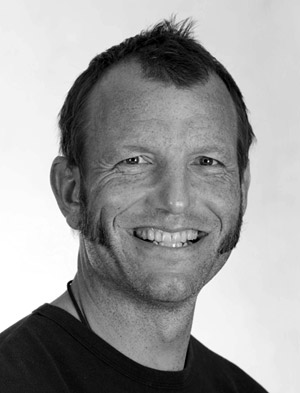 Eerie Shadows & Menacing Clouds
Eerie Shadows & Menacing Clouds
The dogs bark loudly as I drive up to the house with it’s broad white verandah and sweeping views down the hill toward Moonee Beach. Willis has forgotten I am coming, but his partner Sharon pretends otherwise and gets me a cup of tea.
I’ve googled JP Willis before I arrived. I know he is an accomplished artist. That he has works in the collections at the Tate Gallery in London and the Gallery of NSW. His online profile says that his art displays “a preoccupation with human nastiness.” So I am not surprised to see neon coloured images with fighter planes, bombs and parachutes on the living room wall. What is surprising is the complexity and the strange appeal of the pieces. The brilliant backgrounds are somehow joyous and welcoming, yet the layers of glass cast eerie shadows and hide menacing clouds of destruction.
Willis appears. He is also somehow joyous and welcoming, with his lovely grin and lyrical Welsh accent. Sharon heads out to the surf leaving behind the barking dogs and the sleeping baby. Willis and I sit on the porch as the quiet settles back in and he lets me peer behind the layers that hide his own eerie shadows and menacing clouds.
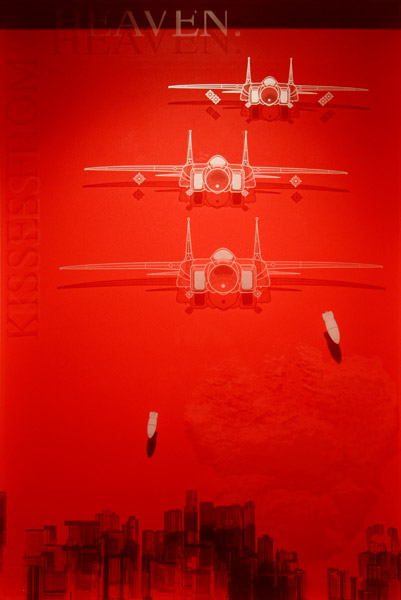 Looking for LoveWas art a calling for you from the beginning?
Looking for LoveWas art a calling for you from the beginning?
I always had sketchbooks in school. The teacher was hopeless so I learned art on my own. I was a young punk rocker so I did a lot of punk stuff, graphic and political.
What was being a punk rocker all about for you?
People described punks as hippies in a different uniform. My father was a hippy. His partners were hippies. I knew the whole hippy scene. I still remember now the very first time I ever heard punk rock. I thought that is the music for me. If we’re going to win, we’re going to win by fighting.
I was a young punk rocker in a Welsh town the size of Coffs Harbour so I’d get pushed around by the skinheads all the time and occasionally got a kick in the face. I was tough.
I had a physical fight with the Heads at school because I refused to wear a uniform, and was expelled. I was this 16-year old punk rocker with a big black Mohawk and I was over it by then.
I wonder aloud if his parents were disappointed with him leaving school so young, and Willis looks away. He explains that he’s read some of my other profiles and he’s not sure he wants to be as honest as others have been. There is a long pause and then he admits that he was in a foster home.
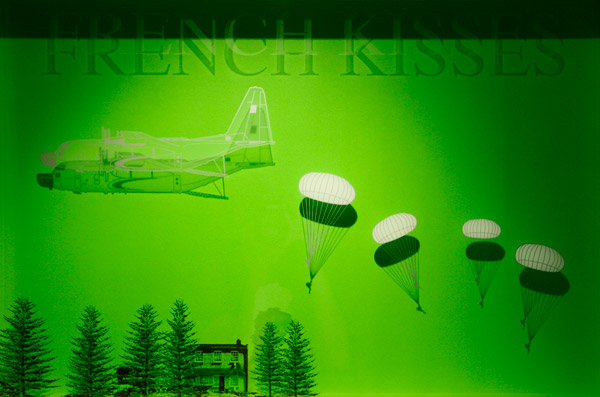 Looking for LoveHow did you end up in a foster home?
Looking for LoveHow did you end up in a foster home?
I didn’t grow up with my mother at all. My father had other things in his life.
I lived with my father until I was 11 but he’d leave me in different places. He’d had a scholarship to do something at Oxford when I was born, and he just went off.
Finally he set it up for me to go into a foster home. He was living with someone else and I didn’t fit in I suppose and he had other things in his life that were more important than his children.
Did you ever see your father again?
Oh yes. He turned up at some point and said, “Come and live with me again.” I did, and let’s just say it was disastrous and I left to stay with some school friends. I went overseas for a while after I left school and when I came back I went to live with my foster parents again.
There’s an endless amount around my father and my foster parents. There’s a line in the movie Bladerunner, “I’ve seen ships burn on the coast of Orion, and I’ve seen blood rain on the water.” The character in the movie is saying he’s seen so much it’s hard to die. But I relate to that statement because I’ve seen and done so much that it’s hard to recount even bits of it, never mind all of it.
I feel the darkness of those eerie shadows on the back of my neck. Willis tells me that he spent some time bumming around in Europe, gave university a try for a year and then headed to London to live the high life as a graphic artist in London. It was in the midst of this alcohol fueled punk-rocker party scene that friends introduced him to surfing. And Willis says this was the saving of him.
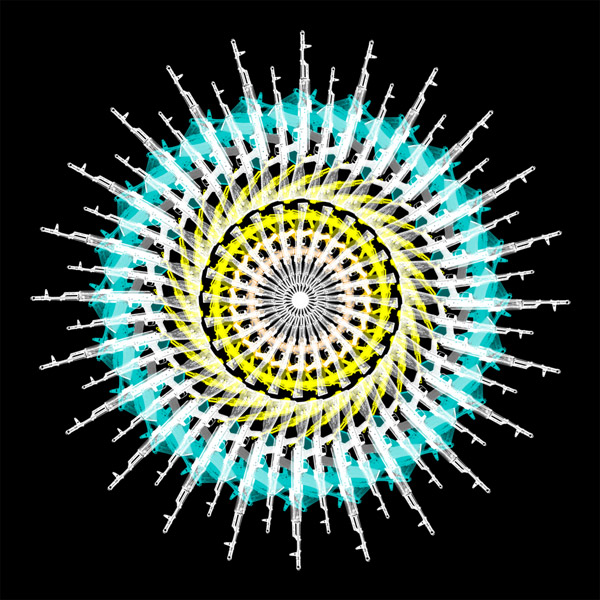 Can you spot the rifles?What appealed to you about surfing?
Can you spot the rifles?What appealed to you about surfing?
To tell you the truth I’ve got no idea, because the first time I went surfing it was the middle of winter in the UK and the water was 8 degrees. I had a surf, jumped in the car, drove back to London and I was so cold and so worn out I thought I wanted to cry all the way home. But it just grabbed hold of me and that was it really.
How did surfing change you?
I’d say that surfing got me on the road to recovery. If I wanted to surf better then I couldn’t be smoking and drinking and partying all the time. I had to be fit. Physically and mentally you can wash off the dirt – anything you’re up tight about or you need to burn off. You get belted a few times by the waves and it reminds you that you’re alive and nothing else really matters.
At last: the light. Willis eventually left the London party scene and got a place at Bristol, one of the top art colleges in the UK where he earned his Honours and then his Masters. By now the quality of his work was apparent and he was offered a place in the Royal College of Art with a fully funded PhD and a teaching position.
But he was over education, and he had met an Australian girl from Coffs Harbour and they had a young son, Van. A move to Coffs Harbour seemed like a good decision. The relationship didn’t last, but Coffs has remained home.
It’s time to talk about his art. Willis takes me on a tour. We examine the Looking for Love series I had spied earlier in his living room, before heading out to the studio, which is filled with work in progress and finished pieces of astonishing variety. Intricately bound books, neon tubing wound into the shape of a gun, a Bhuddist mandala that on close examination proves to be made up of Black Hawk helicopters.
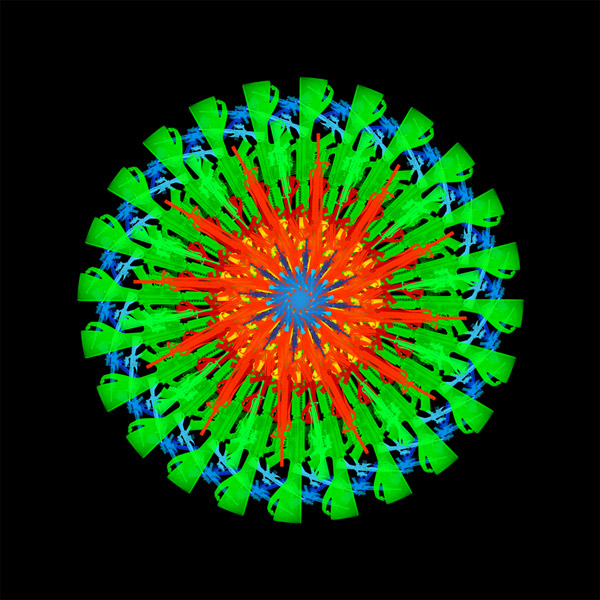 It's beautiful...but can you see the AK47s?How has your past influenced your art?
It's beautiful...but can you see the AK47s?How has your past influenced your art?
I used to work with words a lot. I think that comes down to being a punk rocker. Lots of our graphics had words, and the words were part of what we were saying. At the moment I’ve moved away from that a little. But I might go back.
Now I work a lot with weapons. I think that goes back to being a punk rocker too. The punk scene was aggressive in a non-aggressive way. Being the only punk rocker in a town the size of Coffs Harbour I had to be pretty tough.
So your art is tough?
Everything I create I want to be beautiful. But I don’t mind building it out of things that are not so beautiful. I build things with soft facades that aren’t really that nice underneath, because I’ve experienced a lot of people like that in my life.
Has your artistic career been successful?
I don’t know. I’m still trying to decide if I want to be the top of the world for everyone else or if I’m just doing this for myself. But I would like my art to pay for itself and it doesn’t.
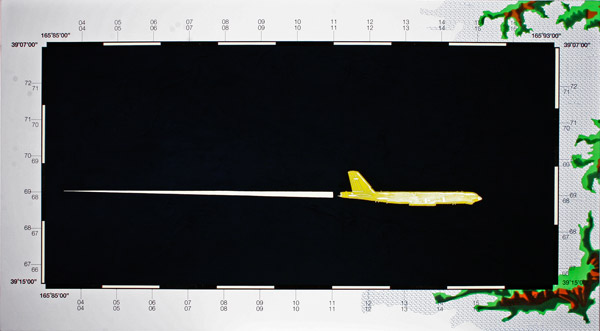 Looking for LoveBut your art is beautiful, why is it not paying for itself?
Looking for LoveBut your art is beautiful, why is it not paying for itself?
I don’t promote myself enough. I like to make it, but as soon as I’ve finished I could give a shit. I want to make the next thing and I want to make it better than the last one.
Do you think your experiences have made you stronger?
I used to think it had made me stronger. I survived for a lot of my life and that’s a hard thing to get out of. You can’t just run on survival mode. When you’re in survival mode you put stuff to the side, ignore it, which is not the best way to deal with things.
What has given you the light in your life, and in your art?
Well….Sharon really. I respect her. I’ve always made allowances for other people, and I don’t have to do that with her. I think my life with Sharon and my son Van and her two daughters Ellanie and Isabelle and our child Flynn…we’ve really got quite a big family now. I’m a lot better than I’ve been before in my life.
Willis looks comfortable lounging in his studio. I have felt the cool chill of his dark shadows but now I bask in the light of that lovely grin. “I’ve gotten over it,” he tells me, referring to the dark times. “I wouldn’t be who I am if it hadn’t happened.” And so the eerie shadows hide behind the layers of glass, and what we see is the colour and the beauty.
************************************************************
Willis tells me that the most interesting person he knows is Charlie Saunders, a former student. According to Willis, Charlie is not only interesting but "has more stories than The Times". Guess I'd better make sure I set aside a couple of hours for this interview!